Marketing Feasibility Study: Coles Supermarket Private Label Products
VerifiedAdded on 2021/06/18
|20
|3929
|166
Report
AI Summary
This report presents a feasibility study focused on Coles Supermarket's private label branded products, examining their potential in the Australian market. It begins with an executive summary and an introduction to Coles, providing background information and context. The study then delves into market segmentation, assessing market size and diffusion, followed by an analysis of the target market and consumer behavior. A competitive analysis evaluates the landscape of the Australian retail sector. Based on these analyses, the report offers marketing mix recommendations, addressing product, price, distribution, and promotional strategies. The report concludes with a summary of findings and includes a list of references.
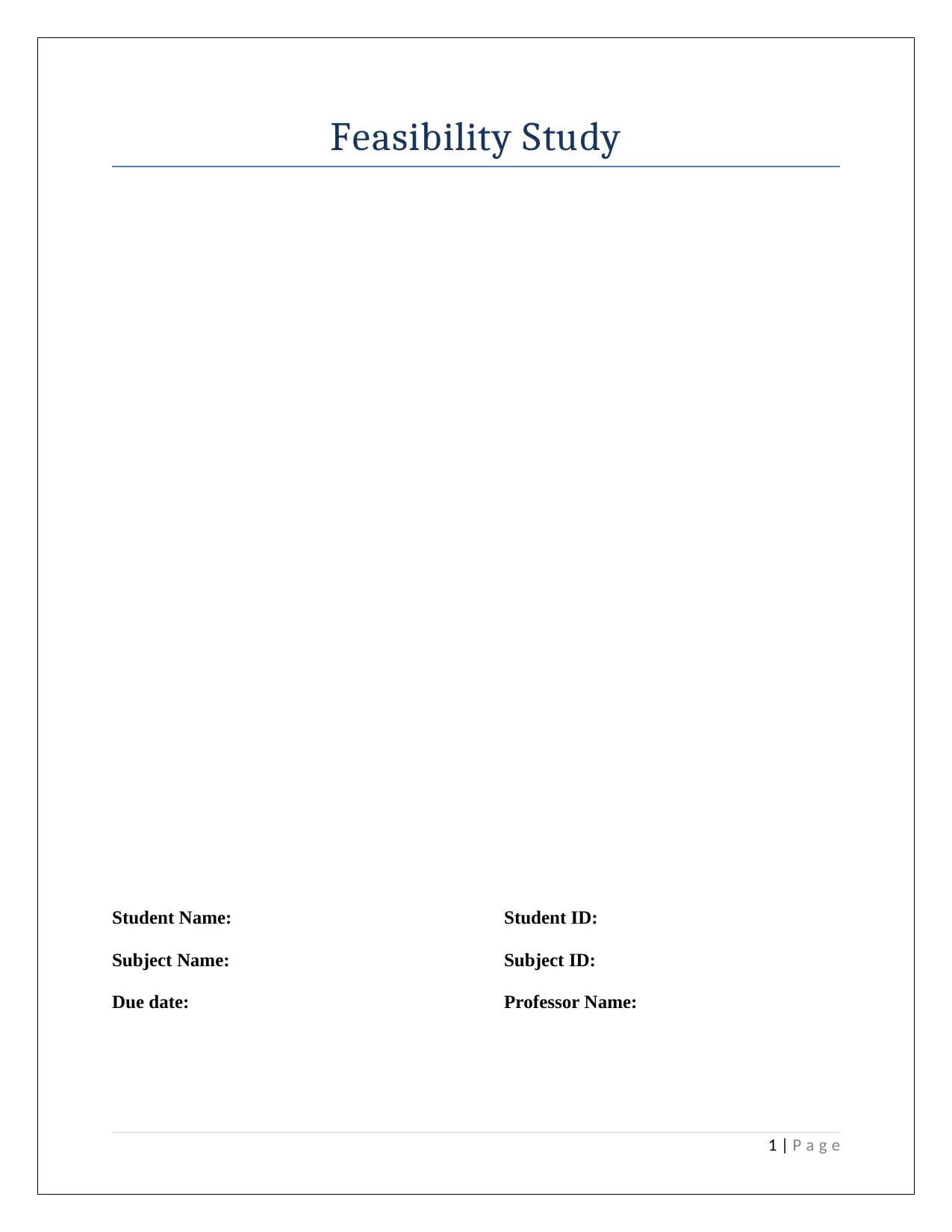
Feasibility Study
Student Name: Student ID:
Subject Name: Subject ID:
Due date: Professor Name:
1 | P a g e
Student Name: Student ID:
Subject Name: Subject ID:
Due date: Professor Name:
1 | P a g e
Paraphrase This Document
Need a fresh take? Get an instant paraphrase of this document with our AI Paraphraser
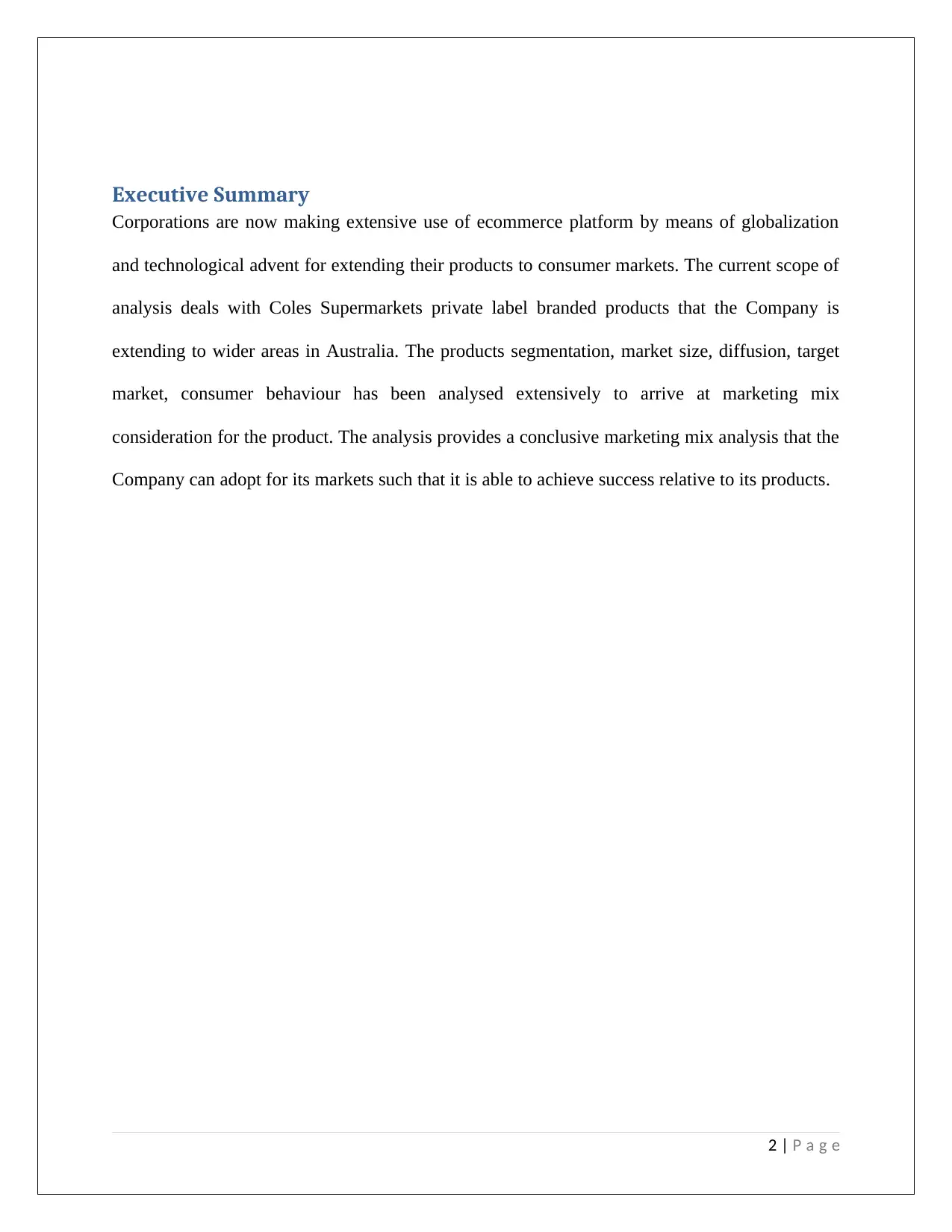
Executive Summary
Corporations are now making extensive use of ecommerce platform by means of globalization
and technological advent for extending their products to consumer markets. The current scope of
analysis deals with Coles Supermarkets private label branded products that the Company is
extending to wider areas in Australia. The products segmentation, market size, diffusion, target
market, consumer behaviour has been analysed extensively to arrive at marketing mix
consideration for the product. The analysis provides a conclusive marketing mix analysis that the
Company can adopt for its markets such that it is able to achieve success relative to its products.
2 | P a g e
Corporations are now making extensive use of ecommerce platform by means of globalization
and technological advent for extending their products to consumer markets. The current scope of
analysis deals with Coles Supermarkets private label branded products that the Company is
extending to wider areas in Australia. The products segmentation, market size, diffusion, target
market, consumer behaviour has been analysed extensively to arrive at marketing mix
consideration for the product. The analysis provides a conclusive marketing mix analysis that the
Company can adopt for its markets such that it is able to achieve success relative to its products.
2 | P a g e
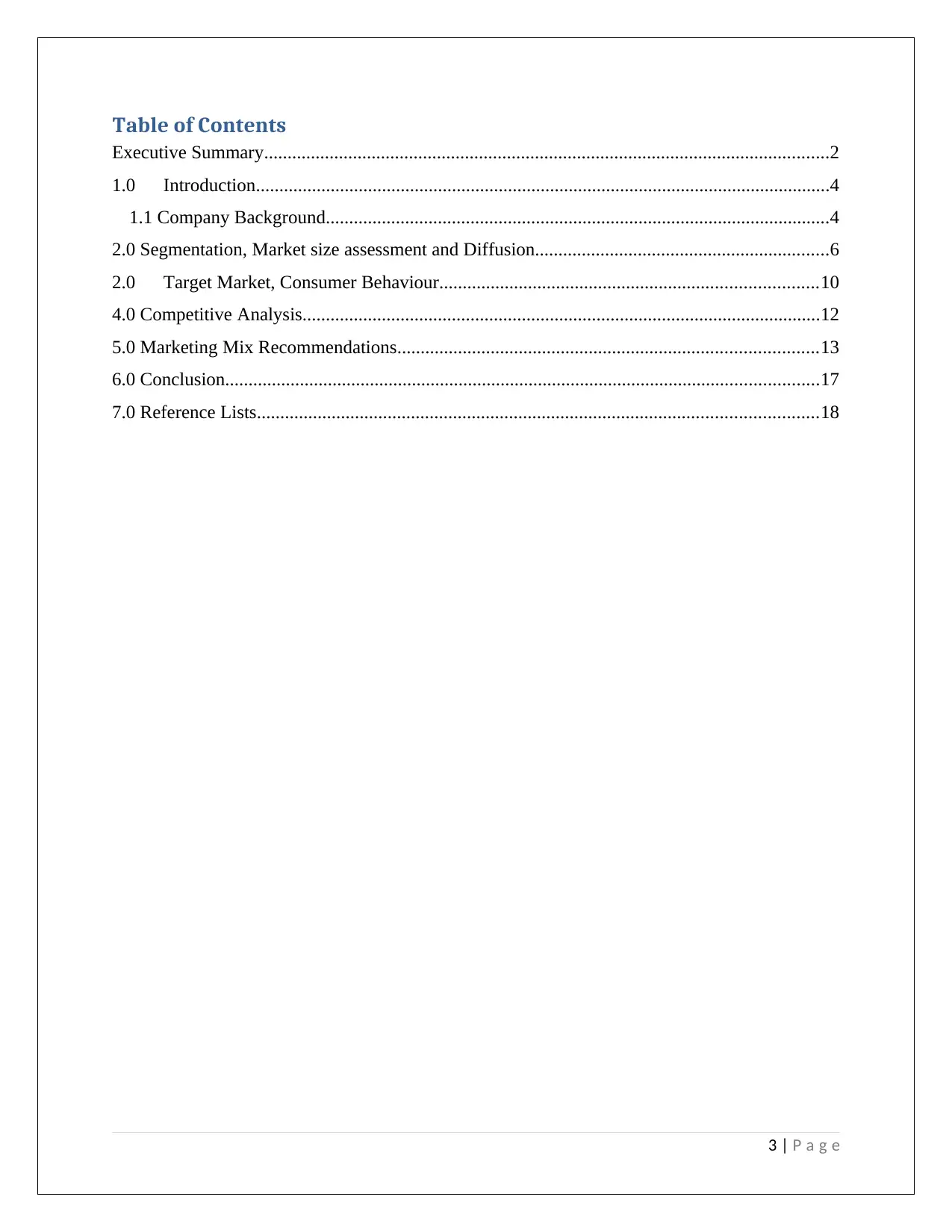
Table of Contents
Executive Summary.........................................................................................................................2
1.0 Introduction...........................................................................................................................4
1.1 Company Background............................................................................................................4
2.0 Segmentation, Market size assessment and Diffusion...............................................................6
2.0 Target Market, Consumer Behaviour.................................................................................10
4.0 Competitive Analysis...............................................................................................................12
5.0 Marketing Mix Recommendations..........................................................................................13
6.0 Conclusion...............................................................................................................................17
7.0 Reference Lists........................................................................................................................18
3 | P a g e
Executive Summary.........................................................................................................................2
1.0 Introduction...........................................................................................................................4
1.1 Company Background............................................................................................................4
2.0 Segmentation, Market size assessment and Diffusion...............................................................6
2.0 Target Market, Consumer Behaviour.................................................................................10
4.0 Competitive Analysis...............................................................................................................12
5.0 Marketing Mix Recommendations..........................................................................................13
6.0 Conclusion...............................................................................................................................17
7.0 Reference Lists........................................................................................................................18
3 | P a g e
⊘ This is a preview!⊘
Do you want full access?
Subscribe today to unlock all pages.

Trusted by 1+ million students worldwide
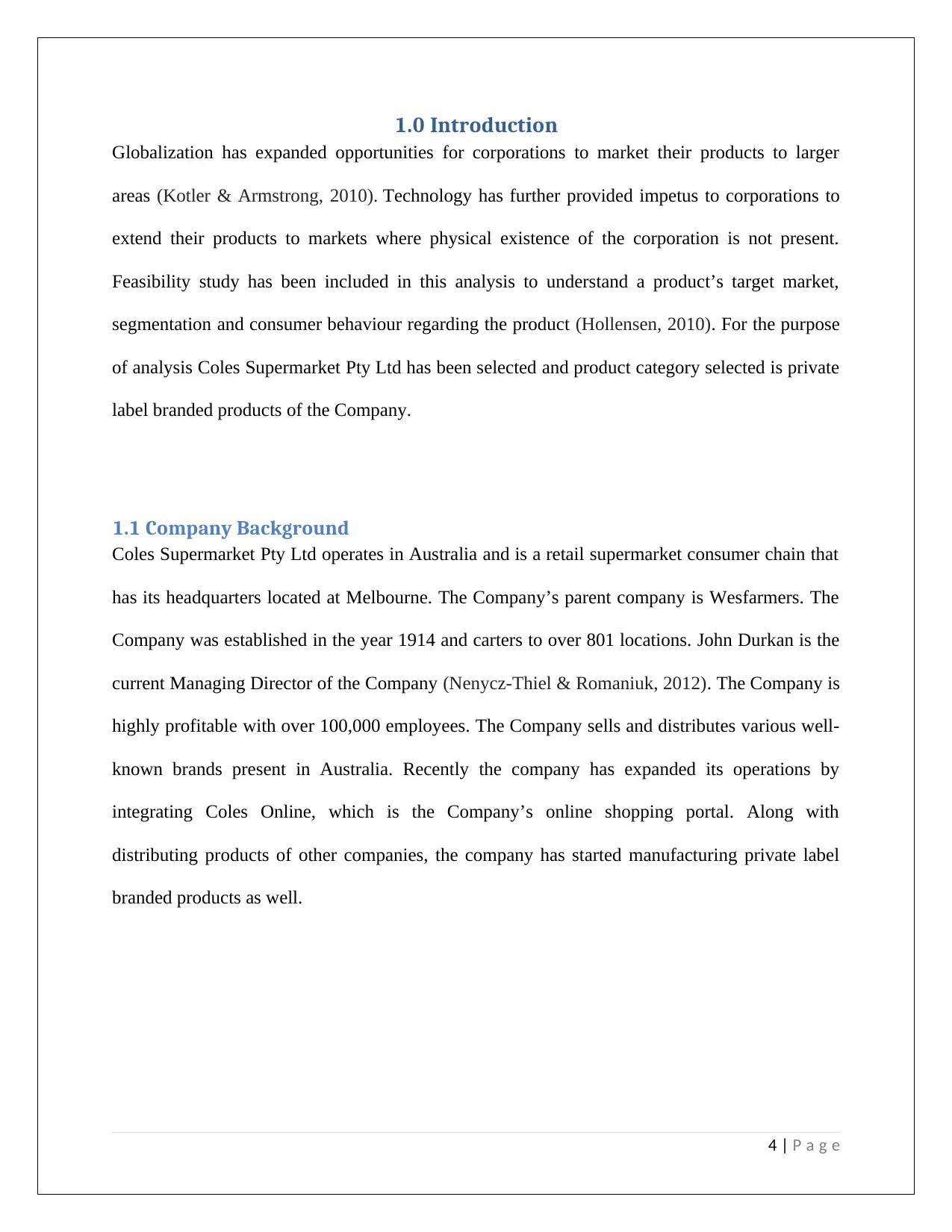
1.0 Introduction
Globalization has expanded opportunities for corporations to market their products to larger
areas (Kotler & Armstrong, 2010). Technology has further provided impetus to corporations to
extend their products to markets where physical existence of the corporation is not present.
Feasibility study has been included in this analysis to understand a product’s target market,
segmentation and consumer behaviour regarding the product (Hollensen, 2010). For the purpose
of analysis Coles Supermarket Pty Ltd has been selected and product category selected is private
label branded products of the Company.
1.1 Company Background
Coles Supermarket Pty Ltd operates in Australia and is a retail supermarket consumer chain that
has its headquarters located at Melbourne. The Company’s parent company is Wesfarmers. The
Company was established in the year 1914 and carters to over 801 locations. John Durkan is the
current Managing Director of the Company (Nenycz-Thiel & Romaniuk, 2012). The Company is
highly profitable with over 100,000 employees. The Company sells and distributes various well-
known brands present in Australia. Recently the company has expanded its operations by
integrating Coles Online, which is the Company’s online shopping portal. Along with
distributing products of other companies, the company has started manufacturing private label
branded products as well.
4 | P a g e
Globalization has expanded opportunities for corporations to market their products to larger
areas (Kotler & Armstrong, 2010). Technology has further provided impetus to corporations to
extend their products to markets where physical existence of the corporation is not present.
Feasibility study has been included in this analysis to understand a product’s target market,
segmentation and consumer behaviour regarding the product (Hollensen, 2010). For the purpose
of analysis Coles Supermarket Pty Ltd has been selected and product category selected is private
label branded products of the Company.
1.1 Company Background
Coles Supermarket Pty Ltd operates in Australia and is a retail supermarket consumer chain that
has its headquarters located at Melbourne. The Company’s parent company is Wesfarmers. The
Company was established in the year 1914 and carters to over 801 locations. John Durkan is the
current Managing Director of the Company (Nenycz-Thiel & Romaniuk, 2012). The Company is
highly profitable with over 100,000 employees. The Company sells and distributes various well-
known brands present in Australia. Recently the company has expanded its operations by
integrating Coles Online, which is the Company’s online shopping portal. Along with
distributing products of other companies, the company has started manufacturing private label
branded products as well.
4 | P a g e
Paraphrase This Document
Need a fresh take? Get an instant paraphrase of this document with our AI Paraphraser
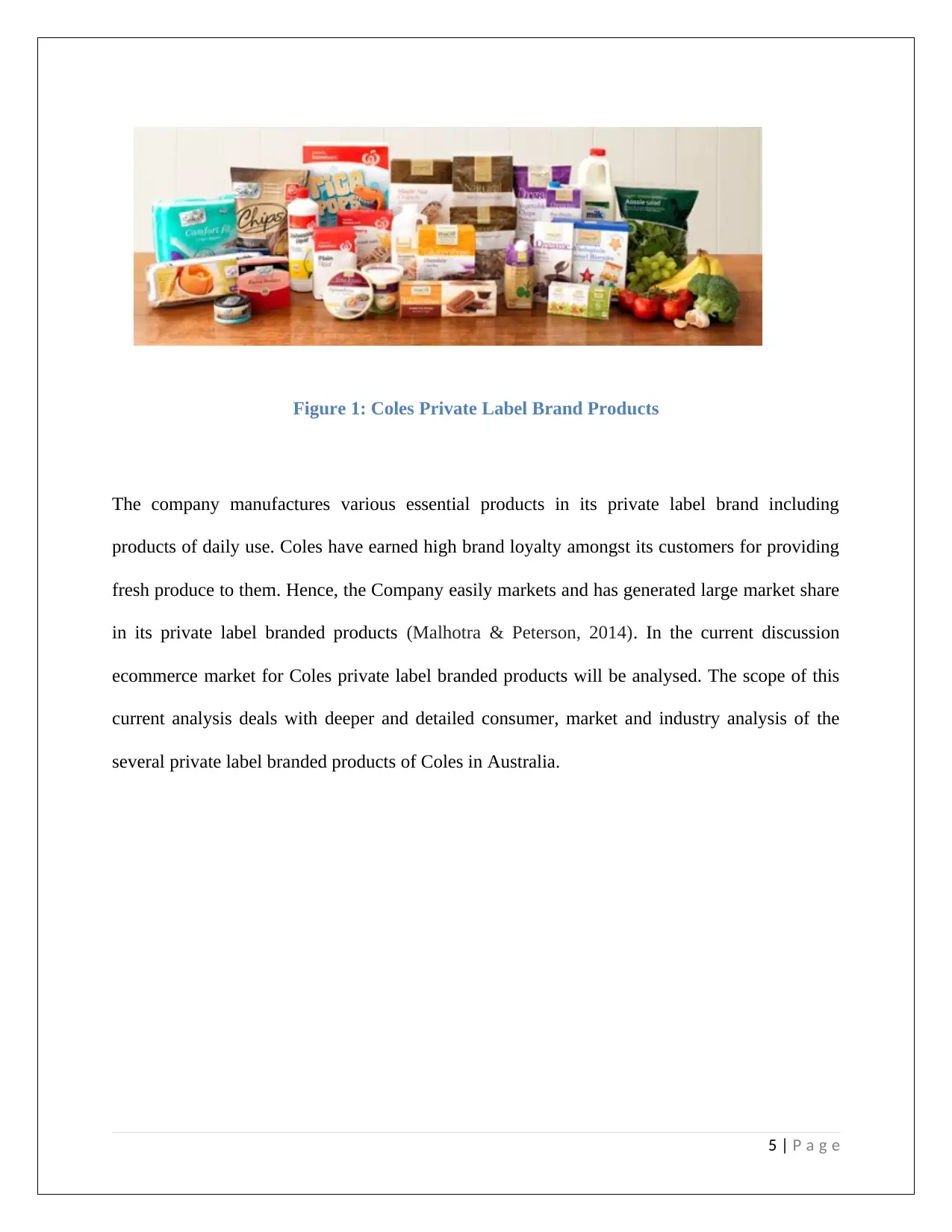
Figure 1: Coles Private Label Brand Products
The company manufactures various essential products in its private label brand including
products of daily use. Coles have earned high brand loyalty amongst its customers for providing
fresh produce to them. Hence, the Company easily markets and has generated large market share
in its private label branded products (Malhotra & Peterson, 2014). In the current discussion
ecommerce market for Coles private label branded products will be analysed. The scope of this
current analysis deals with deeper and detailed consumer, market and industry analysis of the
several private label branded products of Coles in Australia.
5 | P a g e
The company manufactures various essential products in its private label brand including
products of daily use. Coles have earned high brand loyalty amongst its customers for providing
fresh produce to them. Hence, the Company easily markets and has generated large market share
in its private label branded products (Malhotra & Peterson, 2014). In the current discussion
ecommerce market for Coles private label branded products will be analysed. The scope of this
current analysis deals with deeper and detailed consumer, market and industry analysis of the
several private label branded products of Coles in Australia.
5 | P a g e
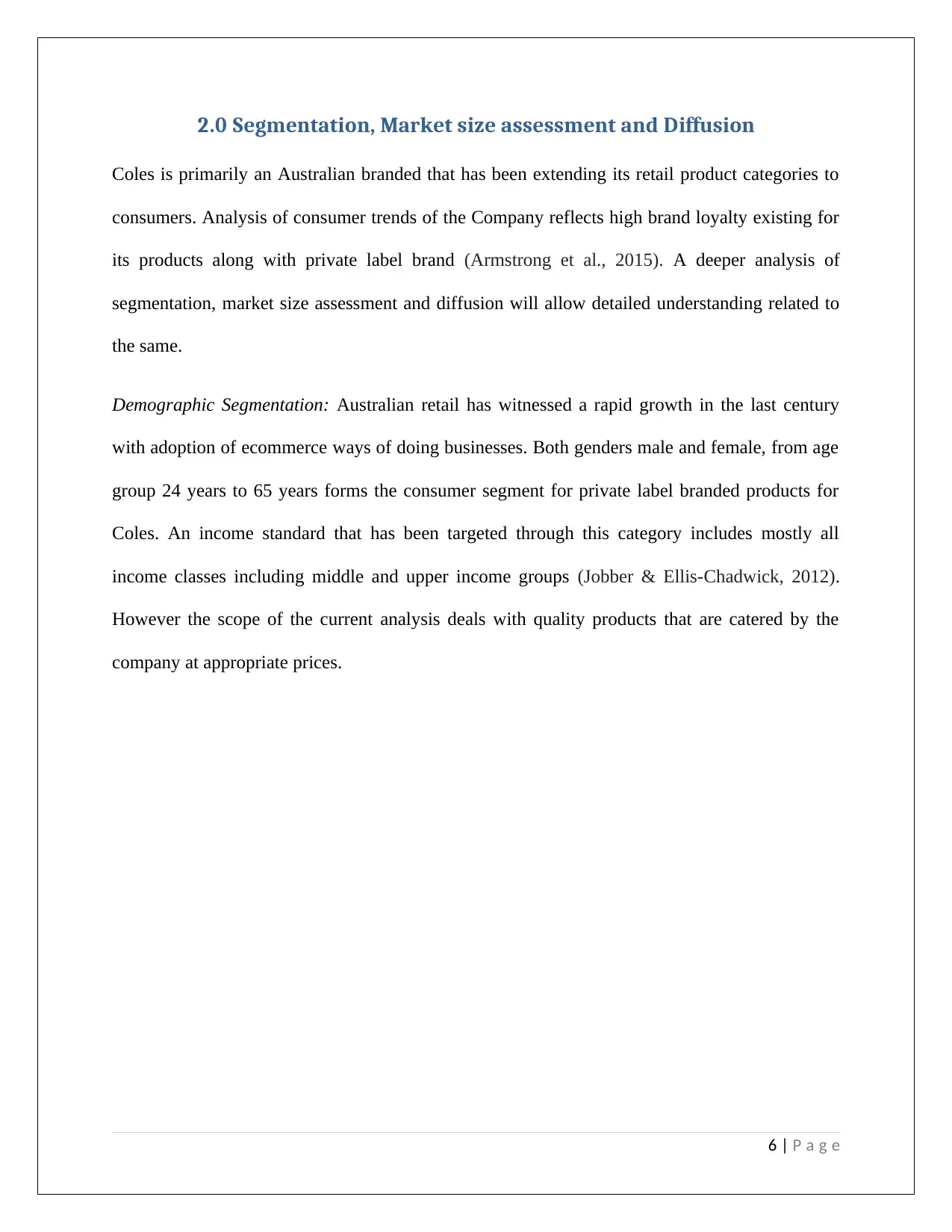
2.0 Segmentation, Market size assessment and Diffusion
Coles is primarily an Australian branded that has been extending its retail product categories to
consumers. Analysis of consumer trends of the Company reflects high brand loyalty existing for
its products along with private label brand (Armstrong et al., 2015). A deeper analysis of
segmentation, market size assessment and diffusion will allow detailed understanding related to
the same.
Demographic Segmentation: Australian retail has witnessed a rapid growth in the last century
with adoption of ecommerce ways of doing businesses. Both genders male and female, from age
group 24 years to 65 years forms the consumer segment for private label branded products for
Coles. An income standard that has been targeted through this category includes mostly all
income classes including middle and upper income groups (Jobber & Ellis-Chadwick, 2012).
However the scope of the current analysis deals with quality products that are catered by the
company at appropriate prices.
6 | P a g e
Coles is primarily an Australian branded that has been extending its retail product categories to
consumers. Analysis of consumer trends of the Company reflects high brand loyalty existing for
its products along with private label brand (Armstrong et al., 2015). A deeper analysis of
segmentation, market size assessment and diffusion will allow detailed understanding related to
the same.
Demographic Segmentation: Australian retail has witnessed a rapid growth in the last century
with adoption of ecommerce ways of doing businesses. Both genders male and female, from age
group 24 years to 65 years forms the consumer segment for private label branded products for
Coles. An income standard that has been targeted through this category includes mostly all
income classes including middle and upper income groups (Jobber & Ellis-Chadwick, 2012).
However the scope of the current analysis deals with quality products that are catered by the
company at appropriate prices.
6 | P a g e
⊘ This is a preview!⊘
Do you want full access?
Subscribe today to unlock all pages.

Trusted by 1+ million students worldwide
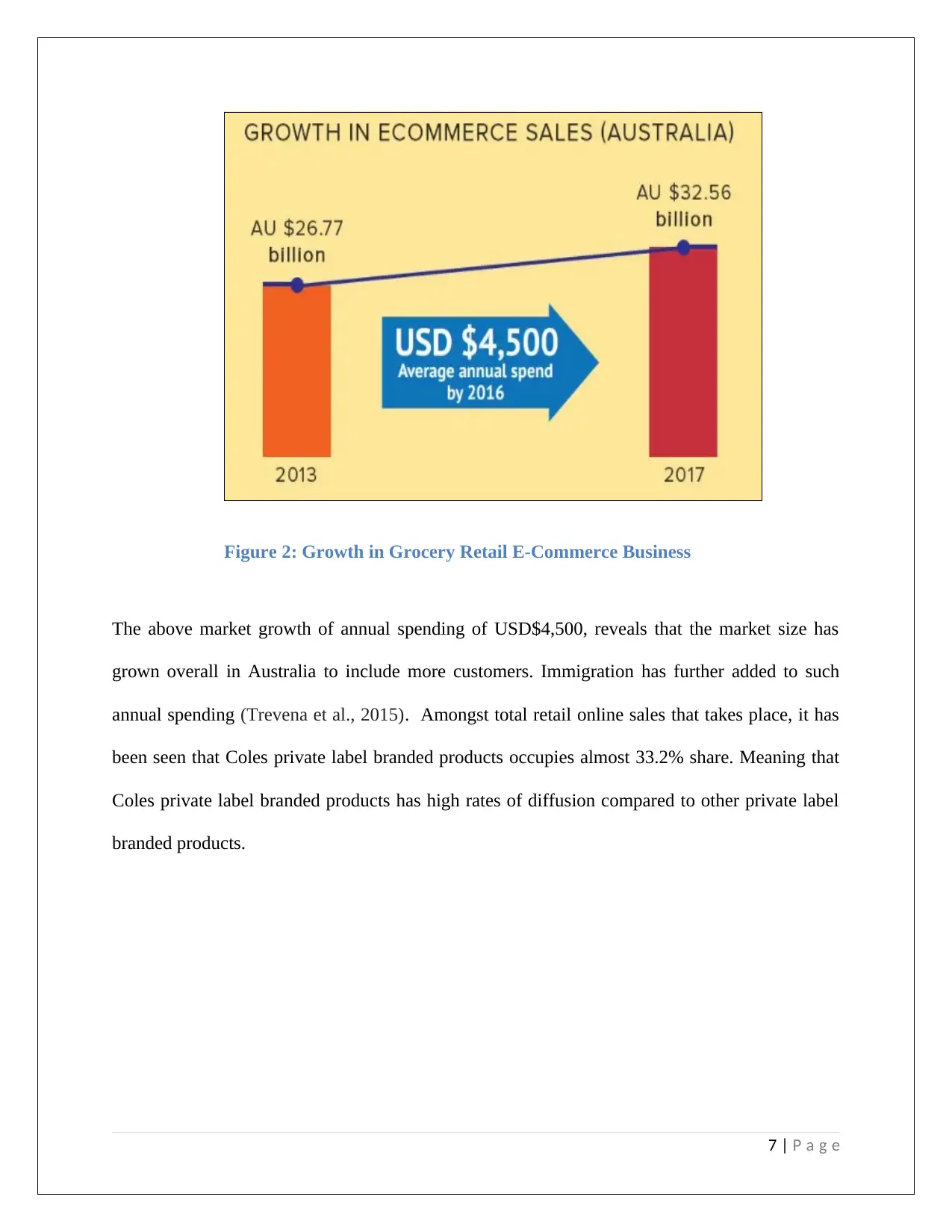
Figure 2: Growth in Grocery Retail E-Commerce Business
The above market growth of annual spending of USD$4,500, reveals that the market size has
grown overall in Australia to include more customers. Immigration has further added to such
annual spending (Trevena et al., 2015). Amongst total retail online sales that takes place, it has
been seen that Coles private label branded products occupies almost 33.2% share. Meaning that
Coles private label branded products has high rates of diffusion compared to other private label
branded products.
7 | P a g e
The above market growth of annual spending of USD$4,500, reveals that the market size has
grown overall in Australia to include more customers. Immigration has further added to such
annual spending (Trevena et al., 2015). Amongst total retail online sales that takes place, it has
been seen that Coles private label branded products occupies almost 33.2% share. Meaning that
Coles private label branded products has high rates of diffusion compared to other private label
branded products.
7 | P a g e
Paraphrase This Document
Need a fresh take? Get an instant paraphrase of this document with our AI Paraphraser
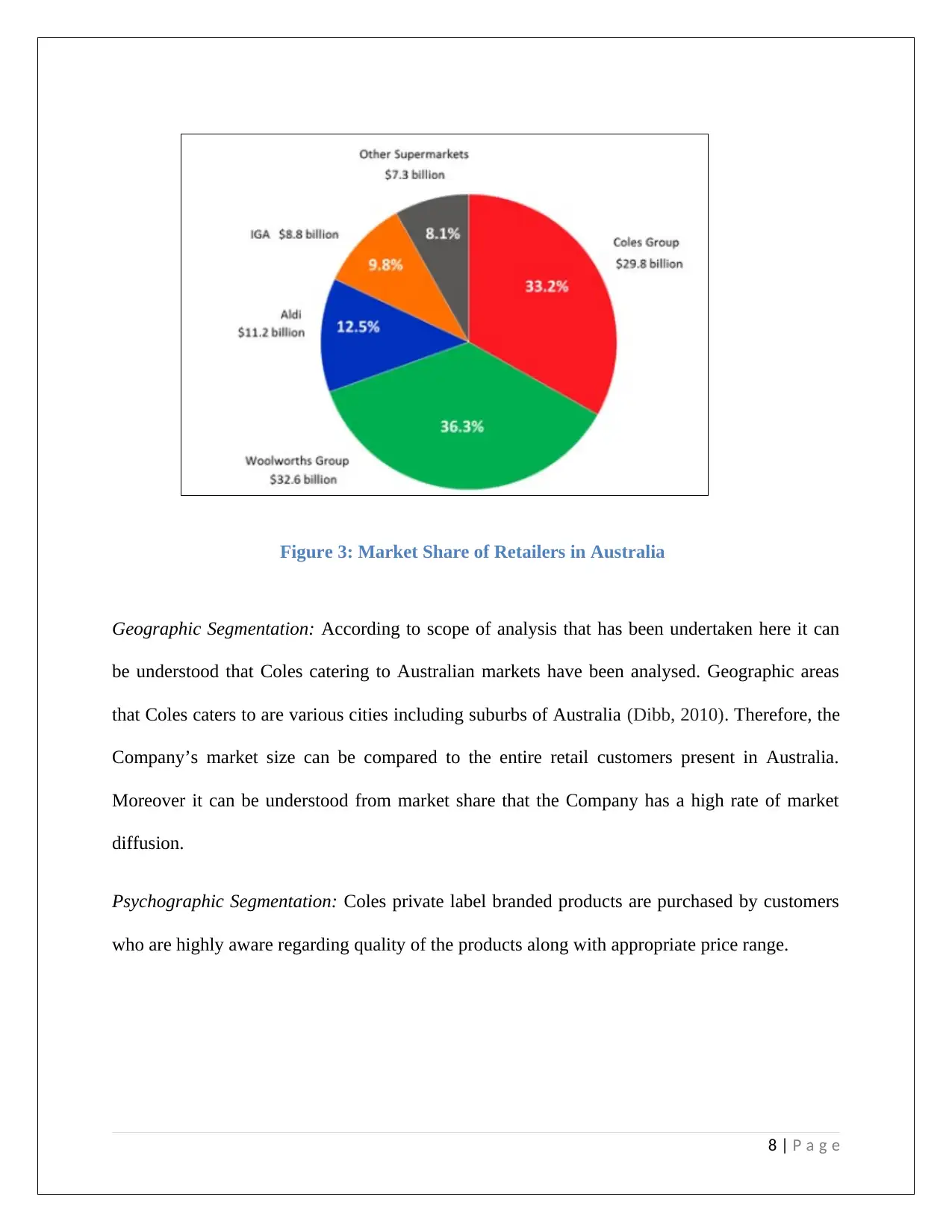
Figure 3: Market Share of Retailers in Australia
Geographic Segmentation: According to scope of analysis that has been undertaken here it can
be understood that Coles catering to Australian markets have been analysed. Geographic areas
that Coles caters to are various cities including suburbs of Australia (Dibb, 2010). Therefore, the
Company’s market size can be compared to the entire retail customers present in Australia.
Moreover it can be understood from market share that the Company has a high rate of market
diffusion.
Psychographic Segmentation: Coles private label branded products are purchased by customers
who are highly aware regarding quality of the products along with appropriate price range.
8 | P a g e
Geographic Segmentation: According to scope of analysis that has been undertaken here it can
be understood that Coles catering to Australian markets have been analysed. Geographic areas
that Coles caters to are various cities including suburbs of Australia (Dibb, 2010). Therefore, the
Company’s market size can be compared to the entire retail customers present in Australia.
Moreover it can be understood from market share that the Company has a high rate of market
diffusion.
Psychographic Segmentation: Coles private label branded products are purchased by customers
who are highly aware regarding quality of the products along with appropriate price range.
8 | P a g e
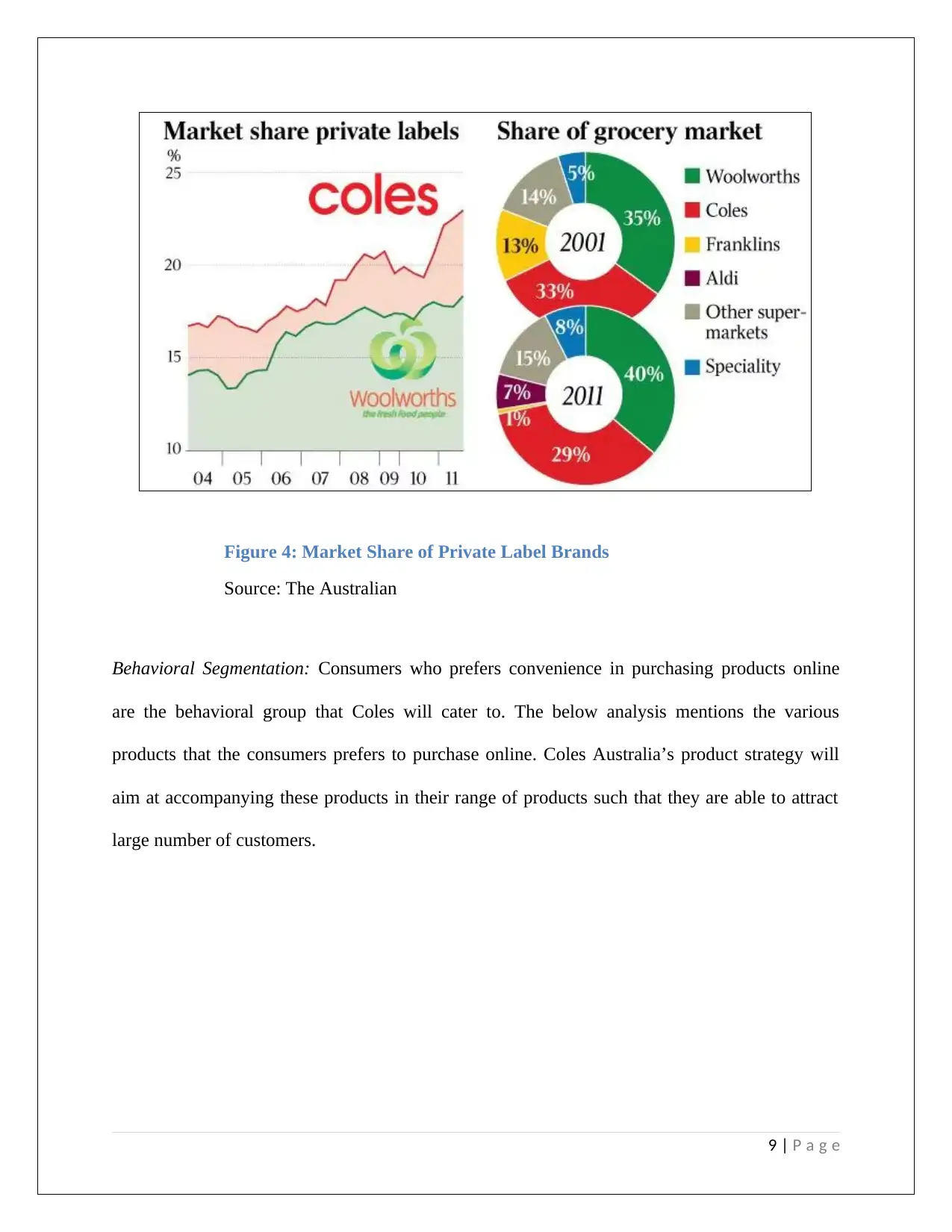
Figure 4: Market Share of Private Label Brands
Source: The Australian
Behavioral Segmentation: Consumers who prefers convenience in purchasing products online
are the behavioral group that Coles will cater to. The below analysis mentions the various
products that the consumers prefers to purchase online. Coles Australia’s product strategy will
aim at accompanying these products in their range of products such that they are able to attract
large number of customers.
9 | P a g e
Source: The Australian
Behavioral Segmentation: Consumers who prefers convenience in purchasing products online
are the behavioral group that Coles will cater to. The below analysis mentions the various
products that the consumers prefers to purchase online. Coles Australia’s product strategy will
aim at accompanying these products in their range of products such that they are able to attract
large number of customers.
9 | P a g e
⊘ This is a preview!⊘
Do you want full access?
Subscribe today to unlock all pages.

Trusted by 1+ million students worldwide
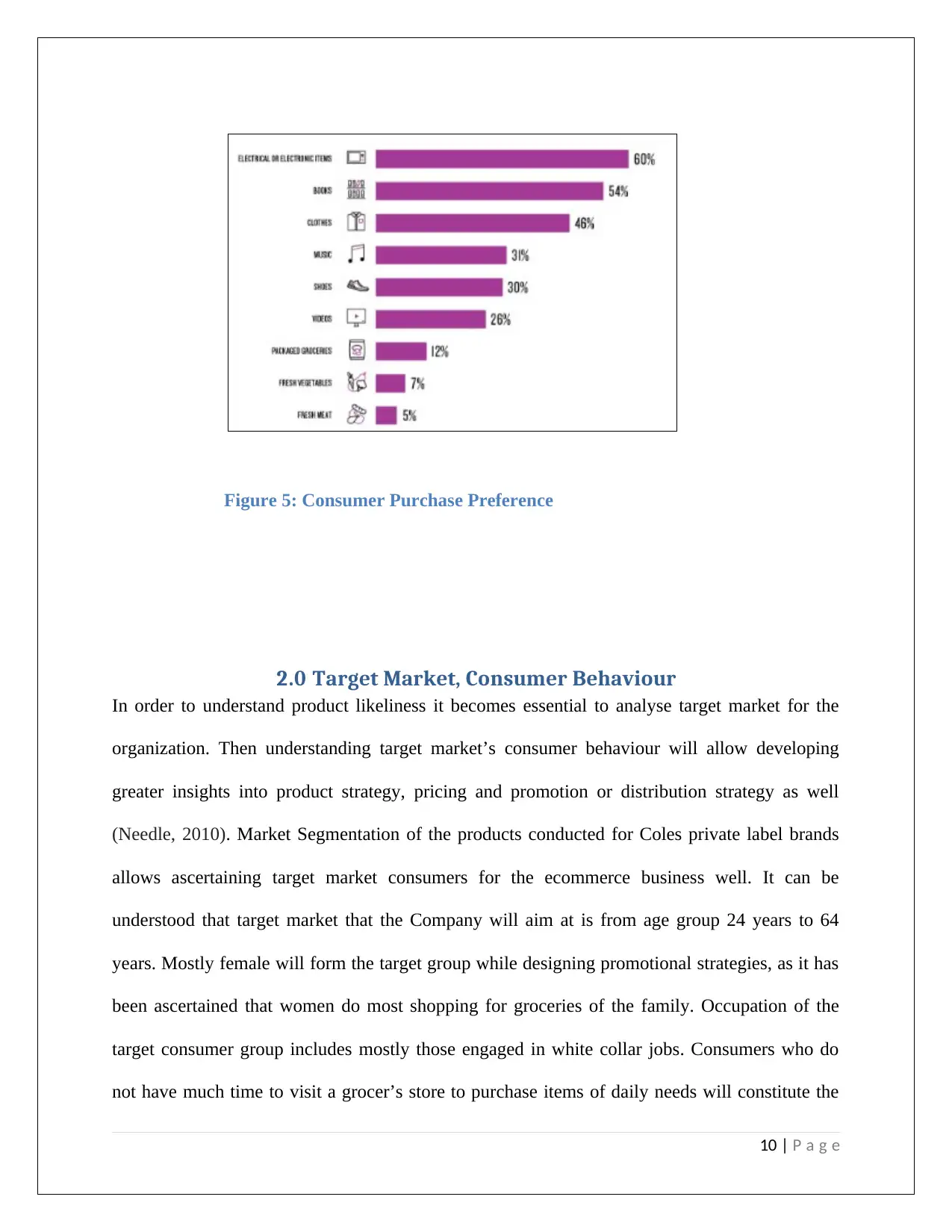
Figure 5: Consumer Purchase Preference
2.0 Target Market, Consumer Behaviour
In order to understand product likeliness it becomes essential to analyse target market for the
organization. Then understanding target market’s consumer behaviour will allow developing
greater insights into product strategy, pricing and promotion or distribution strategy as well
(Needle, 2010). Market Segmentation of the products conducted for Coles private label brands
allows ascertaining target market consumers for the ecommerce business well. It can be
understood that target market that the Company will aim at is from age group 24 years to 64
years. Mostly female will form the target group while designing promotional strategies, as it has
been ascertained that women do most shopping for groceries of the family. Occupation of the
target consumer group includes mostly those engaged in white collar jobs. Consumers who do
not have much time to visit a grocer’s store to purchase items of daily needs will constitute the
10 | P a g e
2.0 Target Market, Consumer Behaviour
In order to understand product likeliness it becomes essential to analyse target market for the
organization. Then understanding target market’s consumer behaviour will allow developing
greater insights into product strategy, pricing and promotion or distribution strategy as well
(Needle, 2010). Market Segmentation of the products conducted for Coles private label brands
allows ascertaining target market consumers for the ecommerce business well. It can be
understood that target market that the Company will aim at is from age group 24 years to 64
years. Mostly female will form the target group while designing promotional strategies, as it has
been ascertained that women do most shopping for groceries of the family. Occupation of the
target consumer group includes mostly those engaged in white collar jobs. Consumers who do
not have much time to visit a grocer’s store to purchase items of daily needs will constitute the
10 | P a g e
Paraphrase This Document
Need a fresh take? Get an instant paraphrase of this document with our AI Paraphraser
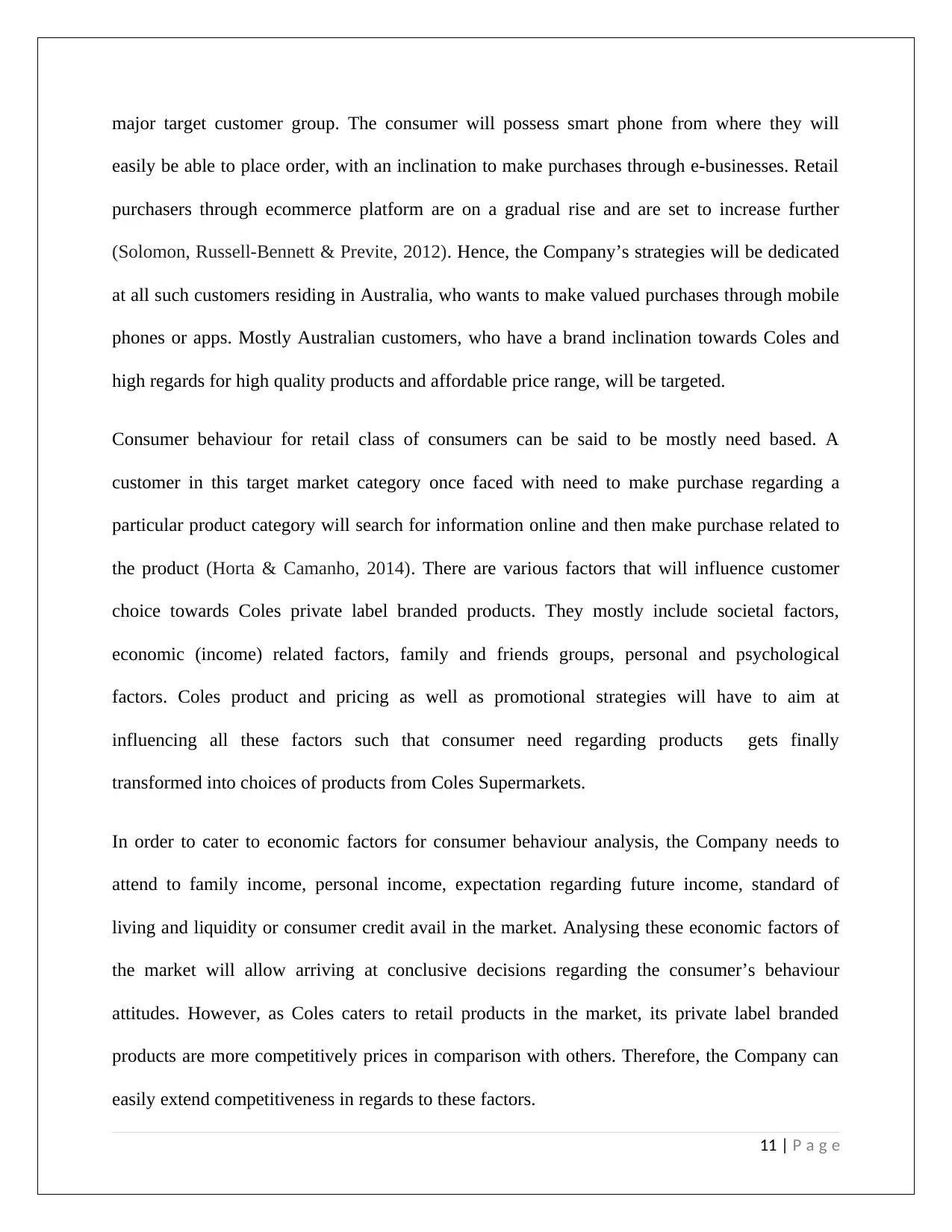
major target customer group. The consumer will possess smart phone from where they will
easily be able to place order, with an inclination to make purchases through e-businesses. Retail
purchasers through ecommerce platform are on a gradual rise and are set to increase further
(Solomon, Russell-Bennett & Previte, 2012). Hence, the Company’s strategies will be dedicated
at all such customers residing in Australia, who wants to make valued purchases through mobile
phones or apps. Mostly Australian customers, who have a brand inclination towards Coles and
high regards for high quality products and affordable price range, will be targeted.
Consumer behaviour for retail class of consumers can be said to be mostly need based. A
customer in this target market category once faced with need to make purchase regarding a
particular product category will search for information online and then make purchase related to
the product (Horta & Camanho, 2014). There are various factors that will influence customer
choice towards Coles private label branded products. They mostly include societal factors,
economic (income) related factors, family and friends groups, personal and psychological
factors. Coles product and pricing as well as promotional strategies will have to aim at
influencing all these factors such that consumer need regarding products gets finally
transformed into choices of products from Coles Supermarkets.
In order to cater to economic factors for consumer behaviour analysis, the Company needs to
attend to family income, personal income, expectation regarding future income, standard of
living and liquidity or consumer credit avail in the market. Analysing these economic factors of
the market will allow arriving at conclusive decisions regarding the consumer’s behaviour
attitudes. However, as Coles caters to retail products in the market, its private label branded
products are more competitively prices in comparison with others. Therefore, the Company can
easily extend competitiveness in regards to these factors.
11 | P a g e
easily be able to place order, with an inclination to make purchases through e-businesses. Retail
purchasers through ecommerce platform are on a gradual rise and are set to increase further
(Solomon, Russell-Bennett & Previte, 2012). Hence, the Company’s strategies will be dedicated
at all such customers residing in Australia, who wants to make valued purchases through mobile
phones or apps. Mostly Australian customers, who have a brand inclination towards Coles and
high regards for high quality products and affordable price range, will be targeted.
Consumer behaviour for retail class of consumers can be said to be mostly need based. A
customer in this target market category once faced with need to make purchase regarding a
particular product category will search for information online and then make purchase related to
the product (Horta & Camanho, 2014). There are various factors that will influence customer
choice towards Coles private label branded products. They mostly include societal factors,
economic (income) related factors, family and friends groups, personal and psychological
factors. Coles product and pricing as well as promotional strategies will have to aim at
influencing all these factors such that consumer need regarding products gets finally
transformed into choices of products from Coles Supermarkets.
In order to cater to economic factors for consumer behaviour analysis, the Company needs to
attend to family income, personal income, expectation regarding future income, standard of
living and liquidity or consumer credit avail in the market. Analysing these economic factors of
the market will allow arriving at conclusive decisions regarding the consumer’s behaviour
attitudes. However, as Coles caters to retail products in the market, its private label branded
products are more competitively prices in comparison with others. Therefore, the Company can
easily extend competitiveness in regards to these factors.
11 | P a g e
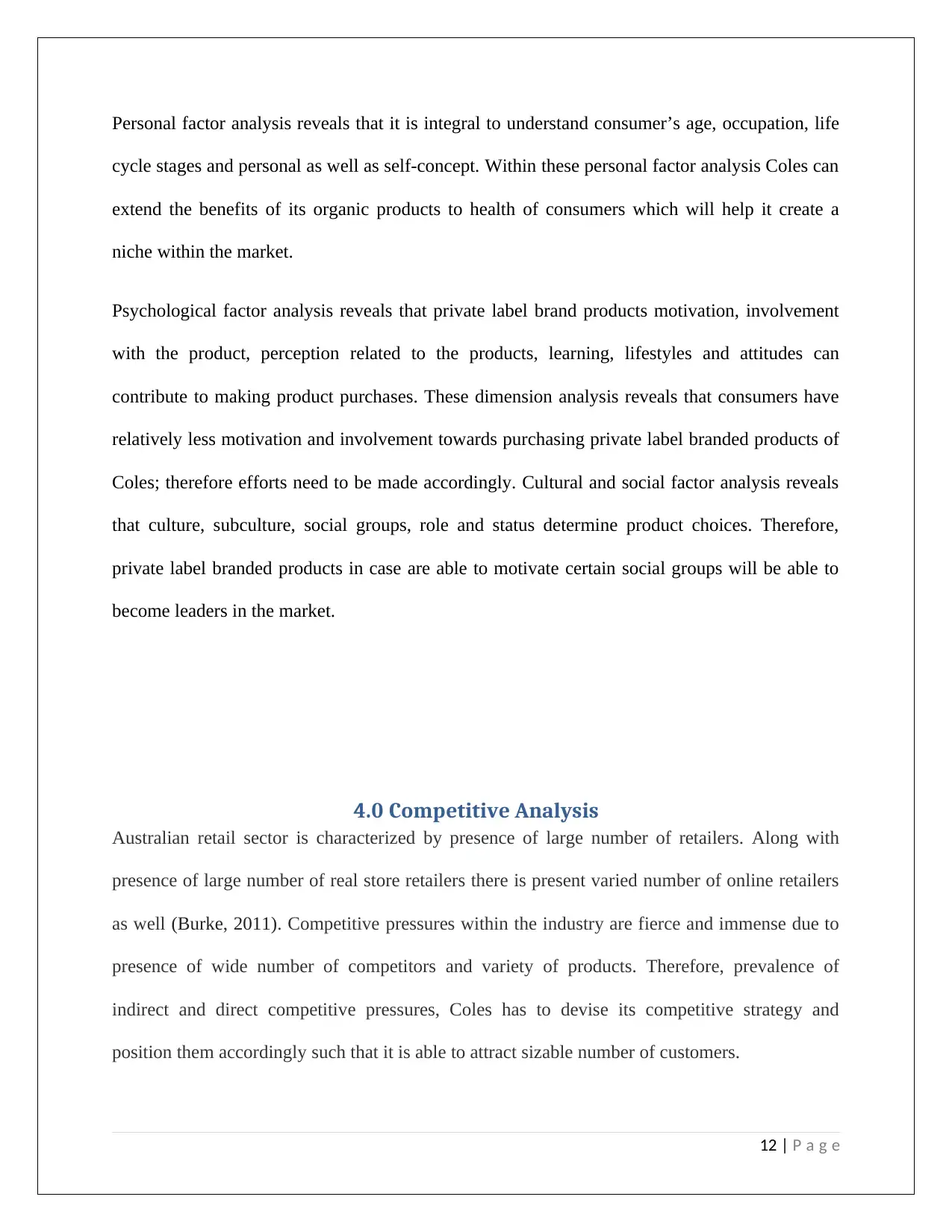
Personal factor analysis reveals that it is integral to understand consumer’s age, occupation, life
cycle stages and personal as well as self-concept. Within these personal factor analysis Coles can
extend the benefits of its organic products to health of consumers which will help it create a
niche within the market.
Psychological factor analysis reveals that private label brand products motivation, involvement
with the product, perception related to the products, learning, lifestyles and attitudes can
contribute to making product purchases. These dimension analysis reveals that consumers have
relatively less motivation and involvement towards purchasing private label branded products of
Coles; therefore efforts need to be made accordingly. Cultural and social factor analysis reveals
that culture, subculture, social groups, role and status determine product choices. Therefore,
private label branded products in case are able to motivate certain social groups will be able to
become leaders in the market.
4.0 Competitive Analysis
Australian retail sector is characterized by presence of large number of retailers. Along with
presence of large number of real store retailers there is present varied number of online retailers
as well (Burke, 2011). Competitive pressures within the industry are fierce and immense due to
presence of wide number of competitors and variety of products. Therefore, prevalence of
indirect and direct competitive pressures, Coles has to devise its competitive strategy and
position them accordingly such that it is able to attract sizable number of customers.
12 | P a g e
cycle stages and personal as well as self-concept. Within these personal factor analysis Coles can
extend the benefits of its organic products to health of consumers which will help it create a
niche within the market.
Psychological factor analysis reveals that private label brand products motivation, involvement
with the product, perception related to the products, learning, lifestyles and attitudes can
contribute to making product purchases. These dimension analysis reveals that consumers have
relatively less motivation and involvement towards purchasing private label branded products of
Coles; therefore efforts need to be made accordingly. Cultural and social factor analysis reveals
that culture, subculture, social groups, role and status determine product choices. Therefore,
private label branded products in case are able to motivate certain social groups will be able to
become leaders in the market.
4.0 Competitive Analysis
Australian retail sector is characterized by presence of large number of retailers. Along with
presence of large number of real store retailers there is present varied number of online retailers
as well (Burke, 2011). Competitive pressures within the industry are fierce and immense due to
presence of wide number of competitors and variety of products. Therefore, prevalence of
indirect and direct competitive pressures, Coles has to devise its competitive strategy and
position them accordingly such that it is able to attract sizable number of customers.
12 | P a g e
⊘ This is a preview!⊘
Do you want full access?
Subscribe today to unlock all pages.

Trusted by 1+ million students worldwide
1 out of 20
Related Documents
Your All-in-One AI-Powered Toolkit for Academic Success.
+13062052269
info@desklib.com
Available 24*7 on WhatsApp / Email
![[object Object]](/_next/static/media/star-bottom.7253800d.svg)
Unlock your academic potential
Copyright © 2020–2026 A2Z Services. All Rights Reserved. Developed and managed by ZUCOL.





